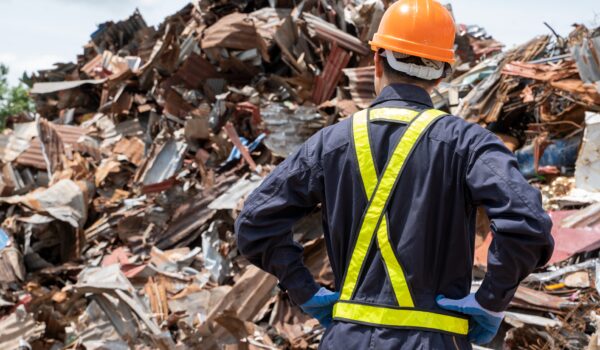Key findings:
- New research reveals plastic waste generated by UK construction companies has grown at an average rate 15 times greater than EU member states since 2004.
- Plastic waste generated by the UK’s construction industry rose by an average rate of 210% every two years between 2004 and 2018.
- Growth in UK plastic waste far outpaces the EU, where plastic outputs from construction activity rose by an average of just 14% in the same period.
Concerns surrounding the safety and environmental impact of plastics have dominated the news cycle in recent years, however attention has generally centred on the packaging industry as the primary driver of plastic pollution.
While work is underway to reduce the packaging industry’s reliance on plastics, less attention has been paid to building and construction – the second largest end-user of the material – for its role in rising plastic pollution.
A new analysis of European Commission data published by the Copper Sustainability Partnership (CuSP) shines a light on the growing rate of plastic waste generated by the UK’s construction industry, which has risen 15 times faster than other European countries since the turn of the century.
The research shows that the amount of plastic waste generated by the UK construction industry increased at an average rate of 210% every two years between 2004 and 2018 – the last year data was collected on construction waste.
In comparison, plastic waste from construction activity across EU member states rose by an average rate of 14% every two years over the same period.
The research also shows that across all UK industries, plastic waste increased by an average rate of 4% every two years – nearly 50 times lower than the rate of growth observed in construction.
Oliver Lawton, Co-founder of CuSP and Managing Director of Lawton Tubes, said: “The research stands as stark testimony to the shift we have witnessed anecdotally in recent years, with suppliers and manufacturers drawn toward cheap plastic materials that are not fit for purpose.
“Contrary to the claims made by plastic manufacturers on the longevity of their products, construction plastics often perform poorly compared to traditional constructional materials, leading to breakages and failures that negate the immediate cost savings associated with plastics.
“At the end of a building’s life cycle, most plastic waste still isn’t recycled and is instead sent to a landfill, exported abroad or incinerated. Low recycling rates also necessitate new plastic products, leading to a linear cycle of production, use and waste.”
EU data shows that the recycling rate for post-consumer polyvinyl chloride (PVC) – the most common type of plastic in construction – is around 3%.
Plastic composites like multi-layer composite pipe (MLCP), which have become increasingly popular over the last 20 years, are often not recycled at all due to difficulties in separating the different materials that make up the product.
In comparison, steel, copper and aluminium – three of the main metals used in construction – have recycling rates of at least 70%.
Co-founder of CuSP and Head of Sales at Mueller Europe, Andrew Surtees, commented: “In the plumbing sector, we have seen newer products like MLCP – a type of composite pipe that physically cannot be recycled – pushed by manufacturers as a sustainable option for installers and homeowners when the opposite is true.
“While most construction plastics are marketed as theoretically recyclable, in reality only traditional buildings with a long-standing history of recovery and recycling will be made of recycled material and go on to be recycled at the end of their life cycle
“With the UK construction industry falling further behind in its net-zero commitments, phasing out plastics in favour of fully recyclable materials with proven sustainability credentials remains one of the biggest opportunities for sustainable growth in the sector.”
Download the dataset behind the research below.

